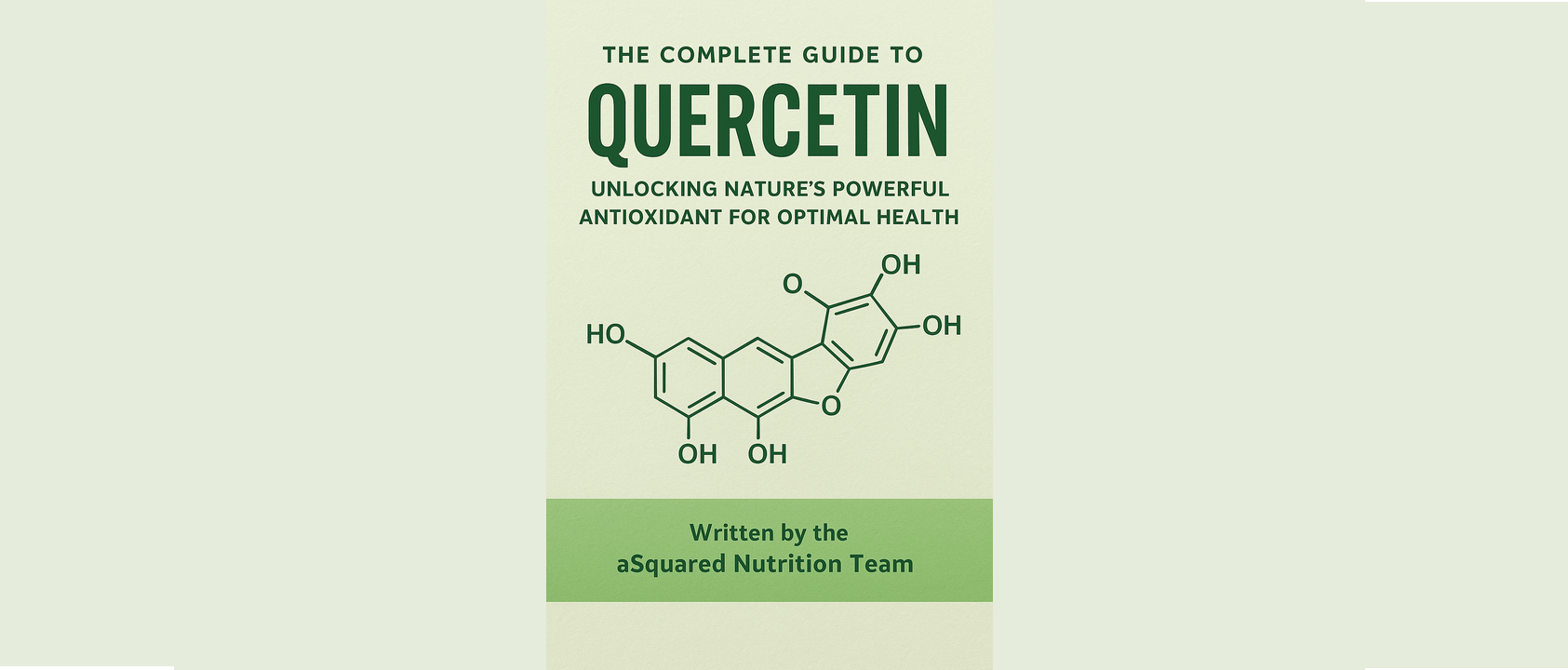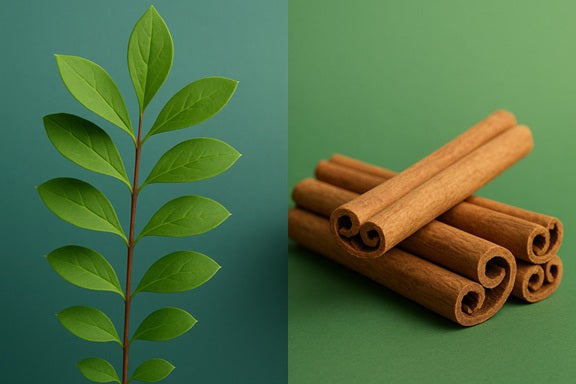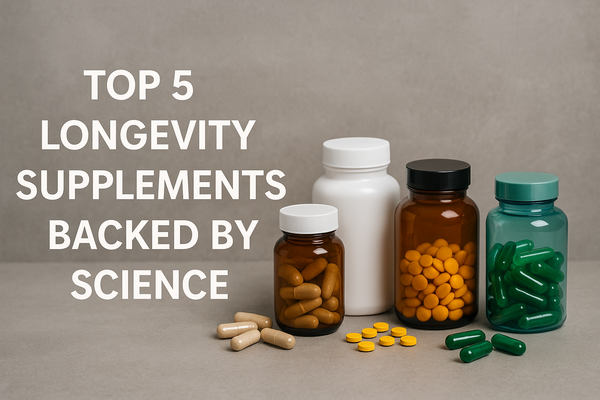In the world of natural health supplements, few compounds have garnered as much scientific attention as quercetin. This remarkable flavonoid, found abundantly in everyday foods like apples, onions, and berries, has emerged as one of nature's most potent antioxidants with far-reaching health benefits. From supporting cardiovascular health to bolstering immune function and fighting inflammation, quercetin represents a cornerstone of nutritional wellness that deserves a place in every health-conscious individual's daily routine.
As research continues to unveil the extensive therapeutic potential of this plant-derived compound, understanding quercetin's mechanisms of action, health benefits, and optimal usage becomes increasingly important for those seeking natural approaches to wellness.

What is Quercetin? Understanding Nature's Master Antioxidant
Quercetin belongs to a class of plant compounds called flavonoids, which are responsible for the vibrant colors found in many fruits and vegetables [1]. As one of the most abundant flavonoids in the human diet, quercetin has been a part of human nutrition for centuries, though its specific health benefits have only recently been understood through modern scientific research.
This powerful compound is classified as a flavonol, a subgroup of flavonoids known for their exceptional antioxidant properties. Quercetin's unique molecular structure enables it to effectively neutralize harmful free radicals and protect cellular structures from oxidative damage [2]. The compound's ability to scavenge reactive oxygen species (ROS) makes it particularly valuable in combating the cellular stress that underlies many chronic health conditions.
According to research, individuals in nations like the USA, Spain, Japan, and China consume approximately 9.76, 18.48, 16.2, and 18 mg of quercetin daily, respectively [3]. However, these amounts may not be sufficient to achieve the therapeutic levels demonstrated in clinical studies, which is where targeted supplementation becomes valuable.
The Science Behind Quercetin's Antioxidant Power
Quercetin's reputation as a master antioxidant stems from its exceptional ability to neutralize free radicals and protect cells from oxidative stress. Research has demonstrated that quercetin's antioxidant effectiveness surpasses that of many other natural compounds, including ascorbic acid in comparative studies [4].
The compound operates through multiple antioxidant pathways, effectively neutralizing hydrogen peroxide radicals, hydroxyl radicals, nitric oxide, and superoxide [5]. This broad-spectrum antioxidant activity makes quercetin particularly valuable in protecting against the diverse array of oxidative stressors encountered in daily life.
Beyond direct free radical scavenging, quercetin also supports the body's endogenous antioxidant systems. Research indicates that quercetin supplementation can regulate GSH (glutathione) levels, decrease MDA (malondialdehyde) levels, and increase SOD (superoxide dismutase) activity [6]. This multi-faceted approach helps maintain optimal cellular function and supports the body's natural defense mechanisms against oxidative stress.
Quercetin's Anti-Inflammatory Properties
Chronic inflammation has been identified as an underlying factor in numerous health conditions, from cardiovascular disease to autoimmune disorders. Quercetin's potent anti-inflammatory properties make it a valuable tool in addressing this fundamental health challenge [7].
Studies have shown that quercetin significantly inhibits TNF-α (tumor necrosis factor-alpha) production and gene expression in a dose-dependent manner [8]. The compound can also suppress the production of other inflammatory cytokines, including IL-1β and IL-6, while simultaneously promoting anti-inflammatory cytokines such as IL-10 [9].
The molecular mechanisms underlying quercetin's anti-inflammatory effects involve the modulation of key signaling pathways, including down-regulation of the NF-κB pathway, a master regulator of inflammatory gene expression [10]. Clinical evidence supports these effects, with research involving sarcoidosis patients demonstrating that quercetin supplementation reduced markers of oxidative stress and inflammation in the blood [11].

Cardiovascular Health Benefits
Cardiovascular disease remains one of the leading causes of mortality worldwide, making the heart-protective properties of quercetin particularly significant. Extensive research has demonstrated that quercetin supplementation can provide multiple cardiovascular benefits, including blood pressure reduction, cholesterol management, and improved endothelial function [12].
A systematic review and meta-analysis of randomized controlled trials found that quercetin supplementation significantly lowered both systolic and diastolic blood pressure, with reductions of up to 7 mmHg in systolic pressure and 5 mmHg in diastolic pressure in hypertensive individuals [13]. These reductions are clinically meaningful and can translate into significant cardiovascular risk reduction over time.
The mechanisms underlying quercetin's cardiovascular benefits include improved endothelial function through enhanced nitric oxide bioavailability, which promotes vasodilation and reduces vascular resistance [14]. Additionally, studies have shown that quercetin supplementation can reduce plasma oxidized low-density lipoprotein (LDL) concentrations, particularly beneficial for cardiovascular protection [15].
Research has also demonstrated that quercetin can improve overall lipid profiles, helping to maintain healthy cholesterol ratios and supporting optimal cardiovascular function [16]. These lipid-modulating effects work synergistically with quercetin's other cardiovascular benefits to provide comprehensive heart protection.
Immune System Support and Antiviral Properties
The immune-supporting properties of quercetin have gained particular attention, with research revealing its potential to enhance immune function and provide antiviral protection. Quercetin's ability to modulate immune responses makes it valuable for maintaining optimal immune health without causing excessive immune activation [17].
Research has demonstrated quercetin's potential antiviral properties against various pathogens, with studies showing that quercetin can inhibit viral replication and reduce viral load in laboratory settings [18]. The compound's antiviral mechanisms appear to involve interference with viral entry into cells and enhancement of the host's antiviral immune responses.
Clinical studies have provided evidence for quercetin's immune-supporting effects, showing that supplementation can reduce the incidence and severity of upper respiratory tract infections, particularly in individuals under physical stress [19]. These findings suggest that quercetin may be especially beneficial for athletes and other individuals whose immune systems may be compromised by intense physical activity or stress.
Neuroprotective Effects and Brain Health
The brain's high metabolic activity makes it particularly vulnerable to oxidative stress and inflammation. Quercetin's neuroprotective properties offer promising potential for supporting brain health and cognitive function throughout the aging process [20].
Research has demonstrated that quercetin can cross the blood-brain barrier, allowing it to exert direct protective effects on brain tissue [21]. This ability to reach the brain is crucial for its neuroprotective function, as many compounds with potential brain benefits are unable to effectively penetrate this protective barrier.
Studies have shown that quercetin can protect against various forms of neurological damage and has demonstrated significant anti-aging effects. Research indicates that quercetin treatment can lengthen lifespan in laboratory models by up to 15%, suggesting potential longevity benefits that may translate to improved cognitive health over time [22].
The compound's potential mood-supporting effects represent another important aspect of its brain health benefits. Research has shown that quercetin treatment increased serotonin levels and prevented MAO-A levels in the brain, suggesting potential benefits for mood balance and emotional well-being [23]. Additionally, quercetin has shown promise in supporting eye health, with studies demonstrating its ability to help prevent age-related eye conditions such as macular degeneration and cataracts [24].
Metabolic Health and Weight Management Support
Emerging research has revealed that quercetin may play a valuable role in supporting metabolic health and healthy weight management. The compound's effects on cellular metabolism and energy production make it a promising tool for individuals seeking to optimize their metabolic function [25].
Studies have shown that quercetin can influence various metabolic pathways, potentially helping to improve insulin sensitivity and glucose metabolism [26]. These effects may be particularly beneficial for individuals looking to maintain healthy blood sugar levels and support overall metabolic wellness.
Research has also suggested that quercetin may help support healthy weight management through its effects on fat metabolism and energy expenditure [27]. The anti-inflammatory properties of quercetin may also contribute to its metabolic benefits, as chronic inflammation is known to interfere with normal metabolic processes [28].
Optimal Dosage and Safety
Understanding the appropriate dosage and safety profile of quercetin is essential for maximizing its health benefits. Research has established that quercetin is generally well-tolerated across a wide range of doses, with most studies using doses between 100-1000 mg daily [29].
For cardiovascular benefits, studies have shown effectiveness with doses as low as 150 mg daily. For immune support and anti-inflammatory effects, higher doses in the range of 500-1000 mg daily may be more appropriate [30]. Safety studies have consistently demonstrated that quercetin supplementation is well-tolerated, with adverse effects rarely reported [31].
Long-term safety data for quercetin supplementation is reassuring, with studies examining extended use showing no significant safety concerns [32]. However, as with any supplement, it's advisable to consult with a healthcare provider before beginning quercetin supplementation, particularly for individuals with existing health conditions or those taking medications.
Natural Food Sources of Quercetin
While supplementation offers a convenient way to achieve therapeutic doses, incorporating quercetin-rich foods into the diet provides additional nutritional benefits and supports overall health. Onions represent one of the richest dietary sources of quercetin, with red onions containing particularly high concentrations [33].
Apples are another excellent source of quercetin, with the compound concentrated primarily in the skin. Eating apples with the skin intact provides significantly more quercetin than peeled apples [34]. Berries, particularly cranberries, blueberries, and blackberries, are rich sources of quercetin and other beneficial flavonoids [35].
Other notable food sources include green tea, red wine (in moderation), broccoli, asparagus, and leafy green vegetables. Capers, though used in smaller quantities, are among the most concentrated sources of quercetin available [36]. Including a variety of these foods in the diet can help ensure adequate quercetin intake while providing numerous other health-promoting nutrients.
Conclusion: Embracing Quercetin for Optimal Health
The extensive body of research surrounding quercetin reveals a compound with remarkable therapeutic potential and an impressive safety profile. From its powerful antioxidant and anti-inflammatory properties to its specific benefits for cardiovascular health, immune function, brain health, and metabolic wellness, quercetin represents one of nature's most versatile health-promoting compounds.
Whether obtained through a diet rich in quercetin-containing foods or through targeted supplementation, this remarkable flavonoid deserves consideration as part of any health-conscious individual's daily routine. The evidence supporting quercetin's health benefits continues to grow, making it an increasingly valuable tool for those seeking natural approaches to health optimization.
By incorporating quercetin into your daily health regimen, whether through food sources or supplementation, you're taking advantage of centuries of traditional use backed by modern scientific validation. This natural approach to health optimization represents the convergence of time-tested wisdom and rigorous scientific research, offering a safe and effective way to support your journey toward optimal health and wellness.
Click here to view our Quercetin supplement
References
[1] Aghababaei, F., & Hadidi, M. (2023). Recent Advances in Potential Health Benefits of Quercetin. *Pharmaceuticals*, 16(7), 1020. https://pmc.ncbi.nlm.nih.gov/articles/PMC10384403/
[2] Song, X., Wang, Y., & Gao, L. (2020). Mechanism of antioxidant properties of quercetin and quercetin-DNA complex. *Journal of Molecular Modeling*, 26, 1-12.
[3] Aghababaei, F., & Hadidi, M. (2023). Recent Advances in Potential Health Benefits of Quercetin. *Pharmaceuticals*, 16(7), 1020.
[4] Alrawaiq, N. S., & Abdullah, A. (2014). A Review of Flavonoid Quercetin: Metabolism, Bioactivity and Antioxidant Properties. *International Journal of PharmTech Research*, 6(3), 933-941.
[5] Maurya, P. K. (2022). Health benefits of quercetin in age-related diseases. *Molecules*, 27(8), 2498.
[6] Azeem, M., Hanif, M., Mahmood, K., et al. (2023). An insight into anticancer, antioxidant, antimicrobial, antidiabetic and anti-inflammatory effects of quercetin. *Polymer Bulletin*, 80, 241-262.
[7] Comalada, M., Camuesco, D., Sierra, S., et al. (2005). In vivo quercitrin anti‐inflammatory effect involves release of quercetin. *European Journal of Immunology*, 35(2), 584-592.
[8] Davis, J. M., Murphy, E. A., Carmichael, M. D., et al. (2009). The flavonoid quercetin inhibits proinflammatory cytokine production. https://pmc.ncbi.nlm.nih.gov/articles/PMC1391952/
[9] Mlcek, J., Jurikova, T., Skrovankova, S., & Sochor, J. (2016). Quercetin and its anti-allergic immune response. *Molecules*, 21(5), 623.
[10] Comalada, M., Camuesco, D., Sierra, S., et al. (2005). In vivo quercitrin anti‐inflammatory effect involves release of quercetin. *European Journal of Immunology*, 35(2), 584-592.
[11] Boots, A. W., Drent, M., de Boer, V. C., et al. (2011). Quercetin reduces markers of oxidative stress and inflammation in sarcoidosis. *Clinical Nutrition*, 30(4), 506-512.
[12] Larson, A. J., Symons, J. D., & Jalili, T. (2012). Therapeutic potential of quercetin to decrease blood pressure. *Advances in Nutrition*, 3(1), 39-46.
[13] Serban, M. C., Sahebkar, A., Zanchetti, A., et al. (2016). Effects of quercetin on blood pressure: a systematic review and meta‐analysis. *Journal of the American Heart Association*, 5(7), e002713.
[14] Larson, A. J., Symons, J. D., & Jalili, T. (2012). Therapeutic potential of quercetin to decrease blood pressure. *Advances in Nutrition*, 3(1), 39-46.
[15] Egert, S., Bosy-Westphal, A., Seiberl, J., et al. (2009). Quercetin reduces systolic blood pressure and plasma oxidised low-density lipoprotein concentrations. *British Journal of Nutrition*, 102(7), 1065-1074.
[16] Conquer, J. A., Maiani, G., Azzini, E., et al. (1998). Supplementation with quercetin markedly increases plasma quercetin concentration without effect on selected risk factors for heart disease. *Journal of Nutrition*, 128(3), 593-597.
[17] Li, Y., Yao, J., Han, C., et al. (2016). Quercetin, inflammation and immunity. *Nutrients*, 8(3), 167.
[18] Chowdhury, P., Sahuc, M. E., Rouillé, Y., et al. (2018). Quercetin and resveratrol inhibit the expression of angiotensin-converting enzyme 2. *Antiviral Research*, 159, 108-111.
[19] Nieman, D. C., Henson, D. A., Gross, S. J., et al. (2007). Quercetin reduces illness but not immune perturbations after intensive exercise. *Medicine & Science in Sports & Exercise*, 39(9), 1561-1569.
[20] Chiang, M. C., Tsai, T. Y., & Wang, C. J. (2023). The potential benefits of quercetin for brain health. *International Journal of Molecular Sciences*, 24(7), 6328.
[21] Youdim, K. A., Dobbie, M. S., Kuhnle, G., et al. (2003). Interaction between flavonoids and the blood–brain barrier. *Journal of Neurochemistry*, 85(1), 180-192.
[22] Aghababaei, F., & Hadidi, M. (2023). Recent Advances in Potential Health Benefits of Quercetin. *Pharmaceuticals*, 16(7), 1020.
[23] Aghababaei, F., & Hadidi, M. (2023). Recent Advances in Potential Health Benefits of Quercetin. *Pharmaceuticals*, 16(7), 1020.
[24] Aghababaei, F., & Hadidi, M. (2023). Recent Advances in Potential Health Benefits of Quercetin. *Pharmaceuticals*, 16(7), 1020.
[25] Jung, C. H., Cho, I., Ahn, J., et al. (2013). Anti-obesity property of quercetin is mediated by the AMPK and MAPK signaling pathways. *Biochemical and Biophysical Research Communications*, 431(2), 402-408.
[26] Eid, H. M., Nachar, A., Thong, F., et al. (2015). The molecular basis of the antidiabetic action of quercetin in cultured skeletal muscle cells. *Pharmacognosy Magazine*, 11(43), 74-81.
[27] Stewart, L. K., Soileau, J. L., Ribnicky, D., et al. (2008). Quercetin transiently increases energy expenditure but persistently decreases circulating markers of inflammation. *Metabolism*, 57(7), S39-S46.
[28] Reuter, S., Gupta, S. C., Chaturvedi, M. M., & Aggarwal, B. B. (2010). Oxidative stress, inflammation, and cancer. *Free Radical Biology and Medicine*, 49(11), 1603-1616.
[29] Andres, S., Pevny, S., Ziegenhagen, R., et al. (2018). Safety aspects of the use of quercetin as a dietary supplement. *Molecular Nutrition & Food Research*, 62(1), 1700447.
[30] Heinz, S. A., Henson, D. A., Austin, M. D., et al. (2010). Quercetin supplementation and upper respiratory tract infection. *International Journal of Sport Nutrition and Exercise Metabolism*, 20(1), 56-62.
[31] Andres, S., Pevny, S., Ziegenhagen, R., et al. (2018). Safety aspects of the use of quercetin as a dietary supplement. *Molecular Nutrition & Food Research*, 62(1), 1700447.
[32] Okamoto, T. (2005). Safety of quercetin for clinical application. *International Journal of Molecular Medicine*, 16(2), 275-278.
[33] Slimestad, R., Fossen, T., & Vågen, I. M. (2007). Onions: a source of unique dietary flavonoids. *Journal of Agricultural and Food Chemistry*, 55(25), 10067-10080.
[34] Boyer, J., & Liu, R. H. (2004). Apple phytochemicals and their health benefits. *Nutrition Journal*, 3(1), 5.
[35] Manach, C., Scalbert, A., Morand, C., et al. (2004). Polyphenols: food sources and bioavailability. *American Journal of Clinical Nutrition*, 79(5), 727-747.
[36] Ioku, K., Pongpiriyadacha, Y., Konishi, Y., et al. (1998). β-Glucosidase activity in the rat small intestine toward quercetin monoglucosides. *Bioscience, Biotechnology, and Biochemistry*, 62(7), 1428-1431.






